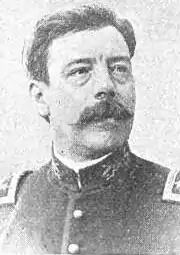Augusto Rouquaud
Augusto Rouquaud (1863-1928) was an Argentine military officer who served as the third chief of the 2nd Line Cavalry Regiment of the Argentine Army.[1] He participated in military expeditions against the Indians, including the main actions produced during the Conquest of the Desert.[2]
Augusto Rouquaud | |
|---|---|
 | |
| Personal details | |
| Born | Augusto Rouquaud Périchon 1863 Buenos Aires, Argentina |
| Died | 1928 Buenos Aires, Argentina |
| Resting place | La Recoleta Cemetery |
| Nationality | Argentine |
| Spouse(s) | Sara Martínez |
| Occupation | Military man |
| Profession | Army |
| Signature | |
| Military service | |
| Allegiance | |
| Branch/service | Argentine Army |
| Years of service | 1880-1907 |
| Rank | Lieutenant Colonel |
| Commands | Regimiento 2.° de Caballería de Linea. |
| Battles/wars | Conquest of the Desert Conquest of the Chaco Revolution of the Park |
Biography
He was born in Buenos Aires, the son Ernest Rouquaud, a French immigrant born on Montgiscard, and Marie Louise Périchon, belonging to a Parisian family. He was married to Sara Martínez, daughter of Guillermo Martínez and Ercilia Correa.[3] He graduated as Ensign at the Military College of the Nation Argentina around 1878. His first destination was in Santa Fe Province where he served as commander of the Fortín of San Bernardo, taking an active part in the defense of local populations against Indigenous incursions.[4]
In 1888 he was sent to serve in Chaco, participating in the main military actions produced in the margins of the Teuco River.[5] He served as third commander of the Regimiento 2.° de Caballería de Línea between 1893 and 1896.[6]
In 1898 he was assigned as Auxiliary of Militias of the Government of Neuquén.[7] In 1903 he served in the city of Necochea as part of the National Forces in the intervention of the Province of Buenos Aires.[8]
In 1906, he was appointed as Inspector of Armaments of the Arsenal Principal de Guerra of the Argentine Republic.[9] He was retired from the army on September 26, 1907.[10]
The Rouquaud Périchon family were linked to the families Broussain, Canavéry, Lennuyeux,[11] Mallié, belonging to the French Society of Buenos Aires.[12]
References
- Colección de leyes y decretos militares concernientes al ejército y armada de la República Argentina, Volumen4. Ercilio Domínguez.
- Las caballadas en la guerra del indio. Editorial Universitaria de Buenos Aires, 1974.
- Fallos y disposiciones de la exma. Cámara de Apelaciones de la Capital. Buenos Aires (Argentina). Cámara de Apelación de la Capital.
- Efemérides militares de la República Argentina, Volumen1. Tall. Gráf. Arsenal Principal de Guerra, 1906.
- Revista, Volumen 50,Números 593-598. Círculo Militar (Buenos Aires, Argentina).
- Boletín Oficial de la República Argentina. 1896 1ra sección. República Argentina.
- Boletín Oficial de la República Argentina. 1898 1ra sección. República Argentina.
- Intervención nacional en la provincia de Buenos Aires, 8 de junio á 27 de noviembre de 1903: informe presentado al excmo. gobierno de la nación por el señor interventor doctor Luis B. Molina. Argentina. Interventor Nacional.
- Boletín Oficial de la República Argentina. 1906 1ra sección. República Argentina.
- Boletín Oficial de la República Argentina. 1907 1ra sección. República Argentina.
- Pequeña historia patagónica. Emecé Editores, 1959.
- Congreso Nacional de Historia sobre la Conquista del Desierto: celebrado en la ciudad de Gral. Roca del 6 al 10 de noviembre de 1979, Volumen1. Academia Nacional de la Historia, 1982.
